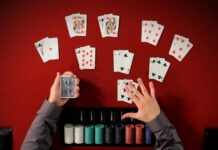Bluffing is a crucial aspect of any poker game. It can make or break a player’s chances of winning. Here are some tips to improve your bluffing strategy:
- Know your opponents: Before you start bluffing, it’s important to understand your opponents’ playing styles. Are they tight or loose players? Do they call or fold often? Knowing this information will help you determine when and how to bluff.
- Use body language: Your body language can give away your intentions, so be aware of how you are sitting and what you are doing with your hands. Try to keep a poker face and avoid any nervous habits that might give away your bluff.
- Be consistent: If you’re consistently bluffing in certain situations, your opponents will be more likely to believe you when you do it again. This can be tricky, as you don’t want to be too predictable, but finding a balance will make your bluffs more effective.
- Timing is key: The timing of your bluff is crucial. Bluffing too early or too late in a hand can give away your intentions. Try to bluff at a point in the hand when your opponents are likely to be unsure of their own hand strength.
- Size your bluffs appropriately: The size of your bet should match the situation at hand. If you’re in a pot with a small amount of money, a large bet may be too obvious. On the other hand, a small bet in a big pot might not be convincing.
- Be aware of your table image: Your table image is the perception your opponents have of you based on how you’ve played in the past. If you’ve been playing tight and conservatively, a sudden bluff may be less likely to be believed.
- Practice, practice, practice: Like any skill, bluffing takes practice. Try to incorporate bluffing into your practice sessions and pay attention to how your opponents react. This will help you fine-tune your bluffing strategy.
By following these tips, you can improve your bluffing strategy and increase your chances of winning at the poker table. Remember, bluffing is not just about being dishonest; it’s about using deception and misdirection to outsmart your opponents.












